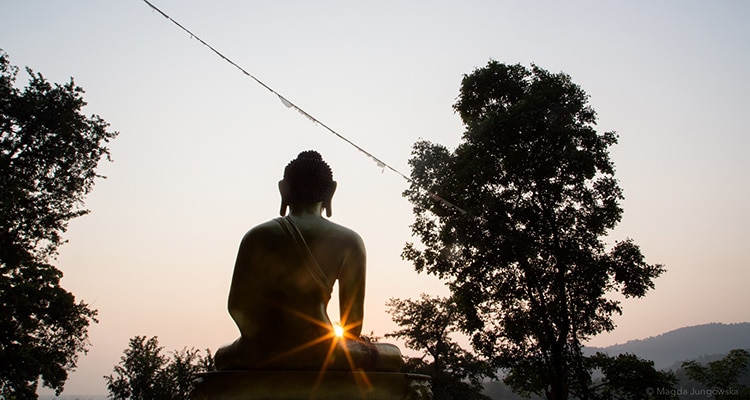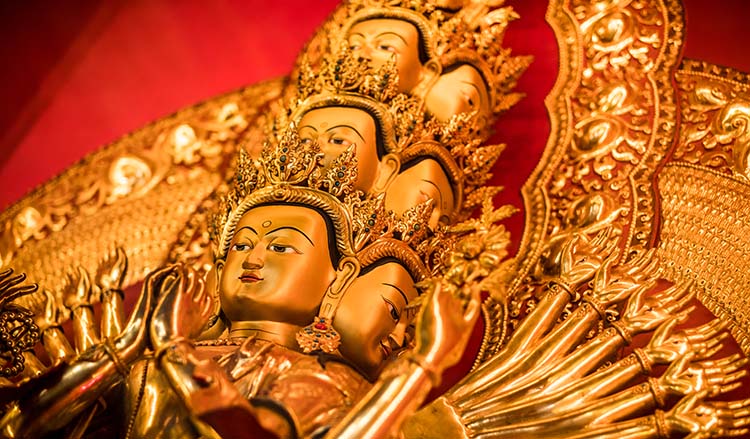What is Selflessness?
Category: Buddhist Meditation | Love & Compassion Meditation | Mind Trainer Articles

Developing a deeper awareness of selflessness through compassion
When we think about our life, about our experience, who we are and how we interact, do we think that we are individuals? Or do we think of ourselves as being part of a greater whole? We probably think that both are true. Aloneness is undeniable; we are born alone, we will die alone. Sometimes we feel very alone when we have to make difficult decisions. We are alone when we have to bear the consequences of our actions. But that’s only one part. The second and probably much more interesting part of life is that we are always in connection, in dependence on others. Think about it—we wouldn’t have even survived our birth if it weren’t for other people who were there to take care of us. This kind of interrelationship continues throughout our lives.
When we focus on just the first aspect of being an individual, separate from others, we become one-sided. Somehow the idea of being the center of the universe creeps in. This is natural in a way, in that whatever we do is motivated by wanting advantages for ourselves and pushing away any discomfort towards others. And frequently we don’t even consider whether someone else has to bear the consequences. That becomes a problem. We can see with globalization that it is not really possible to think of ourselves intelligently as being totally separate; we are being influenced and influencing others all the time, whether consciously or not. It is really important to develop a deeper awareness of how this works.
In his writings the great Indian meditation master and philosopher Shantideva gives a beautiful metaphor for this. He talks about all beings being one whole, one big body. He says, just like with your body, if your foot hurts, your hand will not say, “Oh, that doesn’t concern me. I’m not going to take care of you.” Of course, it is natural to immediately remove a thorn from your foot. In the same way, when we think deeply of ourselves as being part of a whole, being together and interconnected with all beings, it becomes natural to respond to any kind of pain. Pain itself is unpleasant, is negative and therefore should be removed. So here it doesn’t matter whether it is my pain or your pain or somebody else’s pain.
“How wonderful will it be when all beings experience each other as limbs on the one body of life.”
– Shantideva
Responding this way to the pain of others is something that seems unnatural at first, because we have to train in it, but then it becomes second nature. You can see this in a very natural way with mothers caring for their young. When mothers see their children hurting, it is completely normal to immediately do their best to remove the pain. In the mother’s state of mind, the self is not at the center of the universe anymore. This is what’s called selfless or selflessness. It’s an attitude that doesn’t put the self before everybody else. We can gradually develop this attitude, train in meditation to discover selflessness.
Now the notion of selflessness can easily be misunderstood. Many people are afraid that if they don’t put themselves first, then who else will? “I don’t want anyone trampling on me.” The practice of compassion very often triggers fears that we will experience more pain. But this is a misconception about selflessness. Since we are all interconnected, selflessness doesn’t mean that you’re abnegating your own person. There’s an equality, a balance between self and other. And so meditation on selflessness develops this attitude where you don’t make a distinction between what is good for yourself and what is good for others because deep down you have understood that we are all so deeply interconnected. Whatever good I do for you, I will feel the good for me as well.
So how do we begin to practice selflessness? The first step is to observe our self-centered attitude and to use antidotes against those aspects of self-cherishing that are actually harming us. We can gradually begin to work with this by extending our energy to others. Normally, the way we go about our lives follows how our senses function, as they are directed outwards. Usually when we think about how to become happy in life, we think about what we can get from others. What kinds of material things and pleasures can we get from life, from the world? So we often think that we would be happier if we had more people who loved us, or if our friends would give us more attention. We are very much focused with this movement towards us, pulling things towards the self.
Through the meditation on compassion, we learn that it is actually the other way round. What makes us truly happy is when we have this open heart that can extend love and compassion towards others. That is the real recipe to happiness. Therefore, all this worrying about what we can take from the world, or what others might think about us, is actually secondary.
I live with my mind. So when I’m angry, I’m actually the first who is tense and will suffer. On the other hand, when I am able to love others and see their qualities, to really appreciate them from deep inside, then again, I am the first person who will benefit from that. So whenever we feel down and depressed and think, “Oh, I’m so lonely. Nobody calls me or invites me out,” just take this as a reminder to move towards others and extend love and attention toward them. When we start to think of others in this way, all the rest will take care of itself.
We cannot meditate properly without having compassion. We need a compassionate attitude towards everything that arises in the mind. Compassion is not something that we only focus on others. If we’re not able to direct it at ourselves, then we’re not able to extend it to others in a genuine way. When we meditate, we discover a lot of things about ourselves that we don’t really like. We see our pettiness, and yes, our self-centeredness. We see how we compare ourselves to others all the time. We may find resentment that we are carrying memories of experiences that are long gone. We might even scold ourselves for all of that.
Everybody has their own little hangups, their own dramas, which needs the space to be accommodated. Accommodation means compassion. Compassion brings an openness, a warmth and non-judgmental attitude to what is happening. If we’re able to do that with ourselves, we will be able to do that naturally with others. Openness and compassion always go together.






